1.4K
The gig economy is a labor market characterized by short-term, flexible jobs instead of permanent employment. Powered by digital platforms like Uber, Upwork, and DoorDash, it offers workers autonomy and employers efficiency. But behind the convenience lies a deeper economic question: Is the gig economy empowering workers, or making them more vulnerable?
Advertisement
Gig work is appealing for its flexibility. Workers can set their own schedules, choose their projects, and often work remotely. It suits students, retirees, freelancers, and those with caregiving responsibilities. For businesses, gig workers reduce costs — no need to pay for benefits, office space, or long-term contracts.

